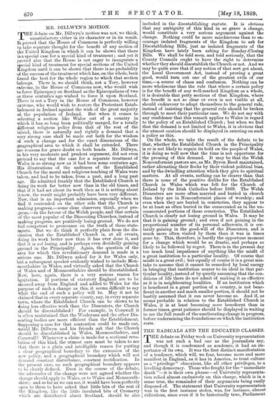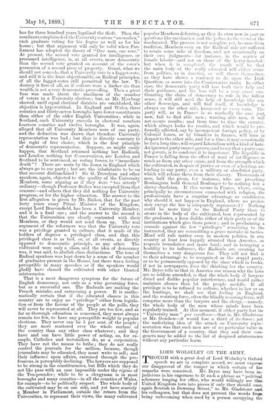THE RADICALS AND THE EDUCATED CLASSES.
THE debate on Friday week on University representation was not such a bad one as the journalists say, and though it is condemned as academic, it had an im- portance of its own. It was the first distinct manifestation of a tendency, which will, we fear, become more and more manifest in England, as it has in America, to treat culture as a " privilege ' obnoxious, like all other privileges, to a levelling democracy. Those whoiought for the "immediate death "—it is their own phrase—of University representa- tion relied almost exclusively on this charge, which is in a sense true, the remainder of their arguments being easily disposed of. The statement that University representation was in the first instance stolen, was, for instance, almost ridiculous, since even if it be historically true, Parliament has for three hundred years legalised the theft. Then the assailants complained of the University seats as "anomalies," each graduate voting for his degree as well as for his house ; but that argument will only be valid when Par- liament has adopted the theory of "One man, one vote."
At present, the second vote granted for intelligence, or presumed intelligence, is, at all events, more democratic than the second vote granted on account of the voter's possession of a second piece of property. Grant, what we should not concede, that a University vote is a faggot-vote, and still it is the least objectionable, on Radical principles, of all the faggot-votes still permitted by the law. To destroy it first of all, as if culture were a darker sin than wealth, is not a very democratic proceeding. Then a great fuss was made about the smallness of the number of voters in a University election ; but, as Mr. Mowbray showed, until equal electoral districts are established, the objection is hypercritical. In England and Wales, three counties and thirty-seven boroughs have fewer constituents than either of the older English Universities ; while in Scotland, each University exceeds in electoral numbers fourteen counties and twelve boroughs. It was, again, alleged that all University Members were of one party, and the deduction was drawn that therefore University representation was bad ; but that is directly contrary to the right of free choice, which is the first principle of democratic representation. Suppose, as might easily happen, that Scotland returned nothing but Radicals, and London nothing but Conservatives, are London and Scotland to be sentenced, as voting forces, to "immediate death " ? There are seats by the dozen in England which always go to one party ; but are the inhabitants to be on that account disfranchised ? Sir G. Trevelyan and other speakers, again, objected to the quality of the University Members, some arguing as if they were "too utterly" ordinary—though Professor Stokes was excepted from that censure—and others that they did nothing for University progress, or for the higher education. The answer to the first allegation is given by Mr. Raikes, that for the past forty years every Prime Minister of the Kingdom, except Lord Beaconsfield, has been a University Member, and it is a final one ; and the answer to the second is that the Universities are clearly contented with their Members, or they would not send them up. The real argument of the reformers was that the University vote was a privilege granted to culture, that it made of the holders of degrees a privileged class, and that this privileged class is as bad, or, at all events, as directly opposed to democratic principle, as any other. The cultivated were only a class, and the idea of democracy was, it was said, to abolish class distinctions. The tone of Radical speakers was kept down by a sense of the number of graduates present in the House, but there was a feeling perceptible in many speeches as if the speakers would gladly have classed the cultivated with other bloated aristocracies.
That is a most dangerous symptom for the future of English democracy, not only as a wise governing force, but as a successful one. The Radicals are making the French mistake, and ostracising a power. It is mathe- matically certain that if the educated classes• in this country are to enjoy no " privilege " either from legisla, Lion or from the favour of the people at the polls, they will never be represented at all. They are too few, and as far as thorough education is concerned, they must always remain too few, to have any perceptible weight in popular. elections. They never can be 5 per cent. of the people ; they are more scattered over the whole surface of the country than any other class whatever ; and they have and can have little power of acting, as, for ex- ample, Catholics and teetotallers do, as a corporation. They have not the means to bribe ; they do not really control the journals for the million, because, though journalists may be educated, they must write to sell; and their influence upon affairs, exercised through the pro- fessions, is perceptibly declining. The lawyers are supposed to be strong in the constituencies, but Bills which they do not like pass with an ease impossible under the regime of the Ten-pounder; while to be a clergyman is in most boroughs and many counties—in all the counties of Wales, for example—to be politically suspect. The whole body of the cultivated may be on one side, and yet have scarcely a Member in Parliament, outside the return from the Universities, to represent their views, the many cultivated popular Members deferring, as they do even now in part on questions like vaccination and the police, to the views of the uneducated. The process is not complete yet, because from tradition, Members even on the Radical side are suffered to retain some relic of freedom, and act occasionally on their own judgments—for instance, in the matter of female labour—and not on those of the horny-handed ; but when it is completed, the result will be that the main body of the really educated will either retire from politics, as in America, or will throw themselves. as they have shown a tendency to do upon the Irish Question, en mese into the Conservative ranks. In either case, the democratic party will lose both their help and their guidance, and the loss will be a very grave one. Granting the claim of democracy to rule in the fullest sense, it will still need the help of knowledge like any other Sovereign, and will find itself, if knowledge is always on the other side, hampered at every turn. The party will, as in France is so markedly the case just now, fail to find able men ; wanting able men, it will not secure results ; and from time to time the country, which always looks for results, and which would be pro- foundly affected, say by incompetent foreign policy, or by Colonial losses, or by blunders in finance, will turn in despair to the other side, and for a time, it may occasionally be for a long time, will regard Liberalism with a kind of hate. An ignorant party cannot govern; and to say that a party can, not govern, is to condemn it to impotence. The Republic in France is falling from the effect of want of intelligence as much as from any other cause, and from the strength which the cultivated, in despair of justice or even of a hearing, are lending to any party, even a military or absolutist party, which will release them from their slavery. Thousands of men, half the pious, for instance, who are preaching Boulangism hold General Boulanger to be nothing but a showy charlatan. If this occurs in France, where, owing principally to circumstances connected with religion, the professionals have a singular advantage as candidates, why should it not happen in England, where no profes- sion except the law is adequately represented ? Nothing could be more fatal to the Radical Party than to create in the body of the cultivated, best represented by the graduates, a keen dislike either of their party or of the institutions which give them power ; and in proclaiming a crusade against the few " privileges " remaining to the instructed, they are committing a grave mistake in tactics. Mind will rule matter even in modern politics, in any country at least less happily situated than America, as respects boundaries and spare land ; and in betraying a hostility to its influence, the Radicals are creating for themselves a very dangerous foe. They will not find it to their advantage to be recognised as the stupid party, or to be permanently opposed by the class which in books, if not in newspapers, does the thinking for the country. Mr. Bryce tells us that in America one reason why the laws are so seldom amended, is that the whole body of lawyers dread and dislike popular interference, and would rather maintain abuses than let the people meddle. If all privilege is to be refused to culture, whether in law or on the hustings, we shall see that feeling in England, and the resisting force, often the blindly resisting force, will comprise more than the lawyers and the clergy,—namely, the whole body of the men whose minds have been regularly trained. At this moment, if either party lost its "University man" par excellence—that is, Mr. Gladstone or Mr. G-oschen—it would lose a third of its force ; yet the underlying idea of the attack on University repre- sentation was that such men are of no particular value in the Government of a country, that they and their con- geners may be added to the list of despised aristocracies without any particular harm.



































 Previous page
Previous page